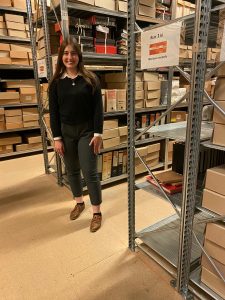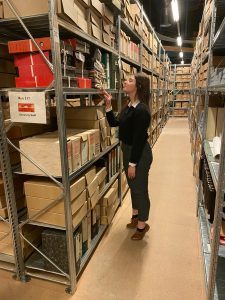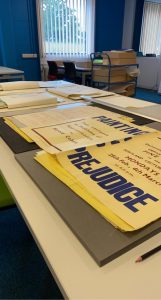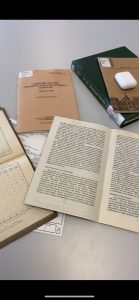September 27, 2022, by Kathryn Steenson
My experience interning for Manuscripts and Special Collections
This is a guest post by Helena, who successfully applied for a Faculty of Arts funded summer work experience placement.
I’m Helena, a second-year History student at the University of Nottingham and I had the amazing experience of getting a placement and working at King’s Meadow Campus for a couple of weeks. My role was to help Dr Rebecca Moore, who’s the Exhibitions Officer and is currently co-curating the upcoming exhibition on Adult Education which will be displayed at the Lakeside Arts Weston Gallery.
Firstly, I went over for an induction day where I was taken around to see the Store, where all the archives are kept, the conservation room and the digitisation room. That was also when I was introduced to the project and the tasks I would be assigned.
Rebecca was wonderful and she made sure I was able to have a go at various tasks, so I could have an all-rounded professional experience, even in a short period. I was able to gain experience in creating and editing transcripts of interviews, done by the other co-curator of the exhibition, Professor John Holford, who interviewed people who used to work or study in the adult education department at the university. I was also able to meet one of the interviewees and I shadowed Rebecca when the former was lending photographs which would be useful for the Adult Education exhibition, ‘Knowledge is Power: Class, Community, and Adult Education‘. This was very interesting because I was able to see the process of copyright and agreements and signatures between the MSC and the person lending the materials.
I was introduced to the process of cataloguing new collections added to the MSC, for instance, I organised and did a box listing of new posters coming in from the central Nottingham library by date and had to add information from the posters to this excel spreadsheet metadata. With this task I was also introduced to care and handling guidelines – I say only ‘introduced’ because all the material I was handling was from the 1950s onwards, therefore they were not in precarious condition. Additionally, I was able to understand better the process of requesting material and how to find items through the software Calm (Axiell), which is used by MSC to catalogue all their material.
I had the opportunity to see how the photographs borrowed by MSC were digitised – since the originals were to be returned – not only to be part of the exhibition but also a part of the overall MSC collection. I was given a very interesting and in-depth explanation of how to adjust the lighting and background so the digitised copy can have a high resolution. I was also introduced to new software – Capture One – which is used to remote shoot the camera and adjust the colour of the digitised copy.
I spent some time getting used to the Adult Education collection from the archive and I did some research to fill the gaps in the history of adult education to which I had been introduced. To that end, I had a go at writing some captions for the pictures which will be displayed in the glass cases at the exhibition. I love reading and doing research, so to have this incorporated into my placement was amazing and, better yet, to have access to such a rich collection of historical papers and books in a Store as massive as the one in MSC was just my nerdiest dream come true.

Helena in the Manuscripts and Special Collections Store, surrounded by shelves and shelves of University of Nottingham institutional archives.
I am very grateful to have had such a wonderful experience with all the experienced staff members at MSC and I wish I could have worked there for longer! But I cannot wait to see the Adult Education exhibition in all its glory in October!
Information about placements here will be on the Careers and Employability Service‘s website. The Knowledge is Power exhibition runs from 27 October – 12 March and information is available on the Lakeside Arts website and Twitter account @mssLakeside.
No comments yet, fill out a comment to be the first




Leave a Reply